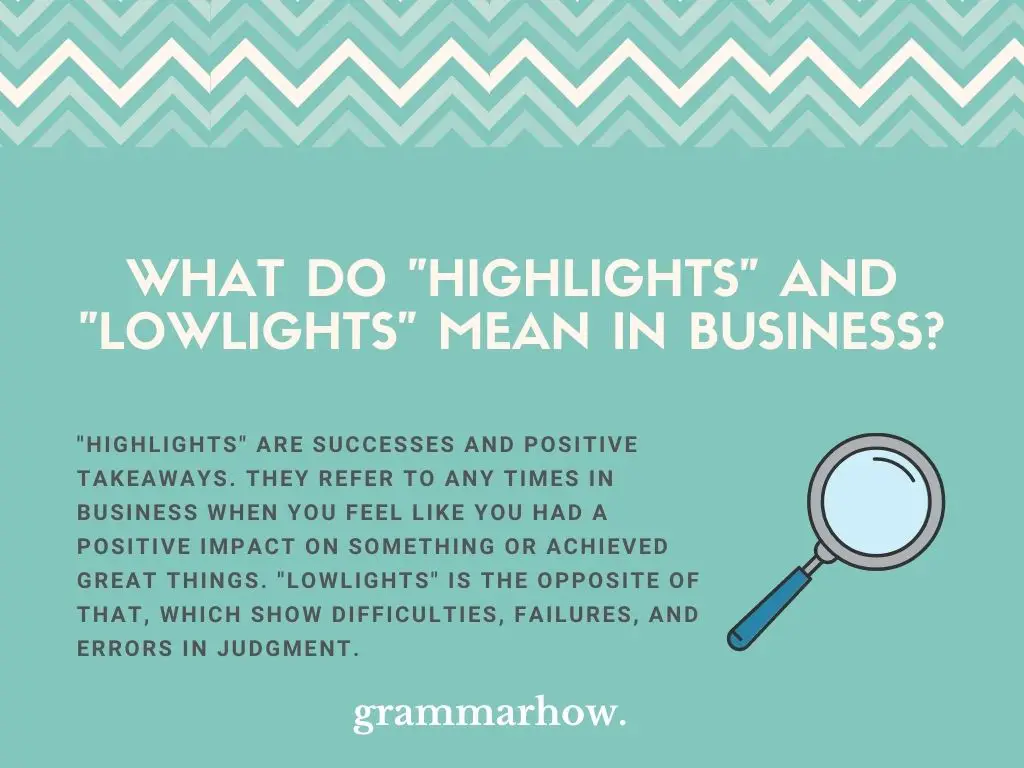When looking for a career change, you are often asked interesting questions about your previous work. Common questions about strengths and weaknesses, or “highlights” and “lowlights,” might leave you stumped. This article will explain how highlights and lowlights work.
What Do “Highlights” and “Lowlights” Mean in Business?
“Highlights” are successes and positive takeaways. They refer to any times in business when you feel like you had a positive impact on something or achieved great things. “Lowlights” is the opposite of that, which show difficulties, failures, and errors in judgment.

The two phrases are not interchangeable. They are the direct opposites of each other, but they are great tools to allow you to evaluate yourself and your performance.
They come from the similar idea of asking someone for their strengths and weaknesses. Employers are always searching for people who can honestly and effectively evaluate their own performance.
Asking someone for their highlights can be quite easy. Most people remember all the positive things they’ve done in their work.
However, when it comes to lowlights, many people will often try and skirt over the question. That’s why it’s a good way to learn more about someone’s character. The more honest of an answer you can get, the more likely they would have been to learn from whatever that failure was.
Highlights in Business
“Highlights” refers to successes and positive impacts. You can use it to refer to things that have gone well for you in the past. In a business sense, it refers to success that you might have found in your previous line of employment.
Highlights mainly pop up as an interview or evaluation question. Employers and bosses will ask you to evaluate your own highlights to see where your priorities might lie in the workplace.
It originates from the painting. Highlights refer to the bright, positive colors that can be seen in all types of painting. The business world (and many other contexts) have adapted it to show positive aspects in your life.
- I have had a few positive highlights in my life. I would really like to share them with you because I think you’ll find them interesting.
- I’ve got to say, one of the biggest highlights for me was getting that promotion after the months of work I put into achieving it.
- My favorite highlight of my previous career came when the boss finally recognized me for what I’m worth rather than just another number.
- There are almost too many highlights to count. One of the best was definitely when I got to meet some of the best in the business.
- I have learned a lot from the highlights of my previous career. I’m ready to take them to my new career here, and I can’t wait to dive in.
Lowlights in Business
“Lowlights” is the direct opposite of “highlights.” It refers to failures or things that could have gone better for you. You might not be proud of those things happening in your career, but they also might have been driving forces to help you learn valuable lessons.
Most people who can honestly talk about their lowlights have the ability to learn from them. The more you can learn, the wiser you will be going forward. This will make you a very valuable employee for most people.
- If you had to be honest, what would you say the lowlights of your previous career were? I would love to know how you value your work.
- I have had a few lowlights in my life. I’m always happy to learn from my mistakes, and I think I’ve matured as an employee because of them.
- You shouldn’t be ashamed of your lowlights. They’re what you should use to turn you into the diligent worker you can become.
- I’m not sure you know how to evaluate yourself well if you can’t even come up with valid lowlights from your past employment.
- I had a few lowlights that related to losing a few clients and customers. I wasn’t proud of them, but I learned a lot from them.
Final Thoughts
“Highlights” and “lowlights” are great evaluation tools used in businesses. They contrast each other in meaning, allowing you to evaluate all the positives (highlights) and negatives (lowlights) of your career. The better you can evaluate yourself, the better you’ll be received by employers.

Martin holds a Master’s degree in Finance and International Business. He has six years of experience in professional communication with clients, executives, and colleagues. Furthermore, he has teaching experience from Aarhus University. Martin has been featured as an expert in communication and teaching on Forbes and Shopify. Read more about Martin here.
